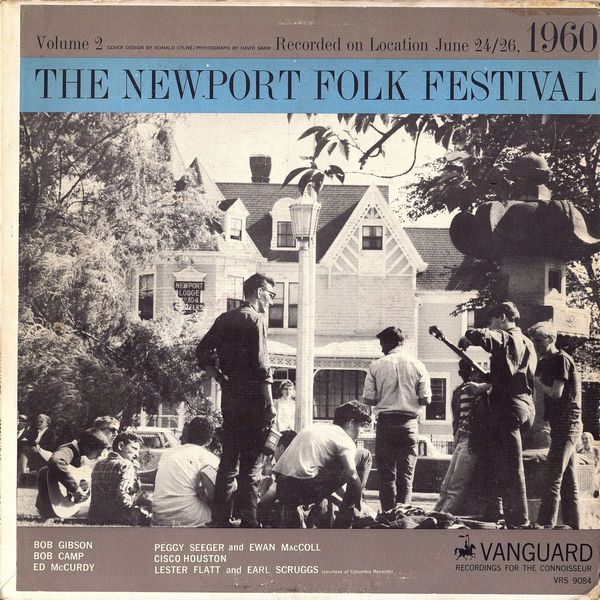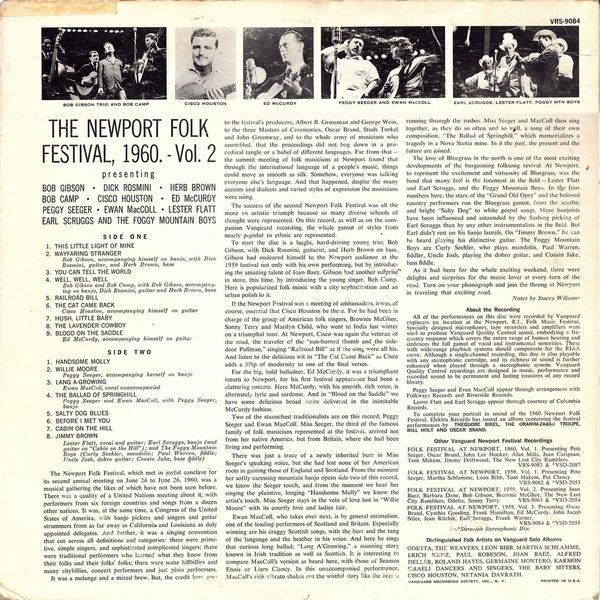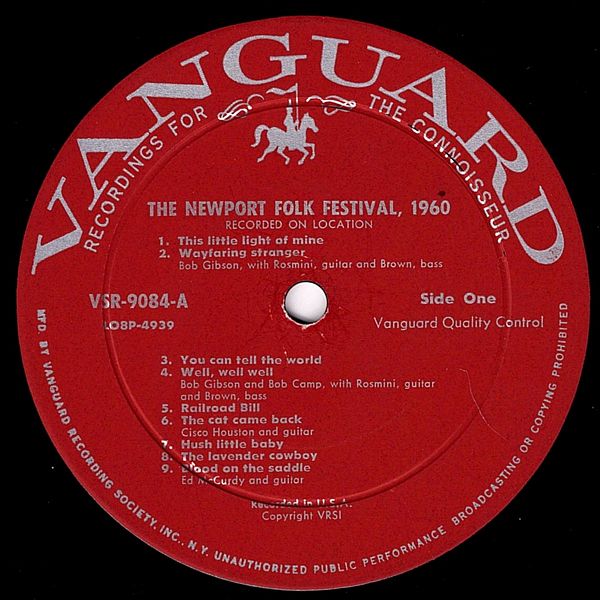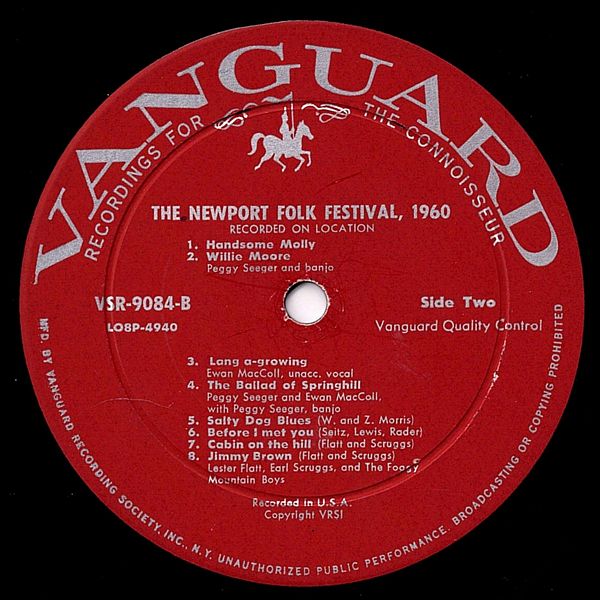
 |


 |
Sleeve Notes
The Newport Folk Festival, which met in joyful conclave for its second annual meeting on June 24 to June 26, 1960, was a musical gathering the likes of which have not been seen before. There was a quality of a United Nations meeting about it, with performers from six foreign countries and songs from a dozen other nations. It was, at the same time, a Congress of the United States of America, with banjo pickers and singers and guitar strummers from as far away as California, and Louisiana as duly appointed delegates. And further, it was a singing convention that cut across all definitions and categories: there were primitive, simple singers, and sophisticated complicated singers; there were traditional performers who learned what they knew from their folks and their folks' folks; there were some hillbillies and many citybillies, concert performers and just plain performers.
It was a melange and a mixed brew. But, the credit here goes to the festival's producers, Albert B. Grossman and George Wein, to the three Masters of Ceremonies, Oscar Brand, Studs Turkel and John Greenway, and to the whole army of musicians who assembled, that the proceedings did not bog down in a procedural tangle or a babel of different languages. Far from that — the summit meeting of folk musicians at Newport found that through the international language of a people's music, things could move as smooth as silk. Somehow, everyone was talking everyone else's language. And that happened, despite the many accents and dialects and varied styles of expression the musicians were using.
The success of the second Newport Folk Festival was all the more an artistic triumph because so many diverse schools of thought were represented. On this record, as well as on the companion Vanguard recording, the whole gamut of styles from nearly popular to ethnic are represented.
To start the disc is a bought, hard-driving young trio; Bob Gibson, with Dick Rosmini, guitarist, and Herb Brown on bass. Gibson had endeared himself to the Newport audience at the 1959 festival not only with his own performing, but by introducing the amazing talent of Joan Baez. Gibson had another surprise in store, this time, by introducing the young singer, Bob Camp. Here is popularized folk music with a city sophistication and an urban polish to it.
If the Newport Festival was a meeting of ambassadors, it was, of course, essential that Cisco Houston be there. For he had been in charge of the group of American folk singers, Brownie McGhee, Sonny Terry and Marilyn Child, who went to India last winter on a triumphal tour. At Newport, Cisco was again the veteran of the road, the traveler of the "sun-burned thumb and the side-door Pullman," singing "Railroad Bill" as if the song were all his. And listen to the delicious wit in "The Cat Came Back" as Cisco adds a fillip of modernity to one of the final verses.
For the big, bold balladeer, Ed McCurdy, it was a triumphant return to Newport, for his first festival appearance had been a clattering success. Here McCurdy, with his smooth, rich voice, is alternately lyric and sardonic. And in "Blood on the Saddle" we have some delicious broad satire delivered in the inimitable McCurdy fashion.
Two of the staunchest traditionalists are on this record, Peggy Seeger and Ewan MacColl. Miss Seeger, the third of the famous family of folk musicians represented at the festival, arrived not from her native America, but from Britain, where she had been living and performing.
There was just a trace of a newly inherited burr in Miss Seeger's speaking voice, but she had lost none of her American roots in gaining those of England and Scotland. From the moment her softly caressing mountain banjo opens side two of this record. we know the Seeger touch, and from the moment we hear her singing the plaintive, longing "Handsome Molly" we know the artist's touch. Miss Seeger stays in the vein of love lost in "Willie Moore" with its courtly love and ladies fair.
Ewan MacColl, who takes over next, is by general estimation, one of the leading performers of Scotland and Britain. Especially winning are his craggy Scottish songs, with the burr and the tang of the language and the heather in his voice. And here he sings that curious long ballad, "Lang A'Growing," a stunning story known in Irish tradition as well as Scottish. It is interesting to compare MacColl's version as heard here, with those of Seamus Ennis or Liam Clancy. In this unaccompanied performance. MacColl's rich vibrato shakes out the wistful story like the running through the rushes. Miss Seeger and MacColl then sing together, as they do so often and so well, a song of their own composition, "The Ballad of Springhill," which memorializes a tragedy in a Nova Scotia mine. In it the past, the present and the future are joined.
The love of Bluegrass in the north is one of the most exciting developments of the burgeoning folksong revival. At Newport, to represent the excitement and virtuosity of Bluegrass, was the band that many feel is the foremost in the field — Lester Flatt and Earl Scruggs, and the Foggy Mountain Boys. In the four numbers here, the stars of the "Grand Old Opry" and the beloved country performers run the Bluegrass gamut, from the acerbic and bright "Salty Dog" to white gospel songs. More banjoists have been influenced and astounded by the flashing picking of Earl Scruggs than by any other instrumentalists in the field. But Earl didn't rest on his banjo laurels. On "Jimmy Brown," he can be heard playing his distinctive guitar. The Foggy Mountain Boys are Curly Sechler, who plays mandolin, Paul Warren, fiddler, Uncle Josh, playing the dobro guitar, and Cousin Jake, bass fiddle.
As it had been for the whole exciting weekend, there were delights and surprises for the music lover at every turn of the road. Turn on your phonograph and join the throng at Newport in traveling that exciting road.
Notes by Stacey William
About the Recording
All of the performances on this disc were recorded by Vanguard engineers on location at the Newport, R.I., Folk Music Festival. Specially designed microphones, tape recorders and amplifiers were used to produce Vanguard Quality Control sound, embodying a frequency response which covers the entire range of human hearing and embraces the full gamut of vocal and instrumental sonorities. Those with wide-range playback systems should compensate for the RIAA curve. Although a single-channel recording, this disc is also playable with any stereophonic cartridge, and its richness of sound is further enhanced when played through a stereophonic system. Vanguard Quality Control recordings are designed in music, performance and recorded sound to be permanent and lasting treasures of any record library.
Peggy Seeger and Ewan MacColl appear through arrangement with Folkways Records and Riverside Records.
Lester Flatt and Earl Scruggs appear through courtesy of Columbia Records.